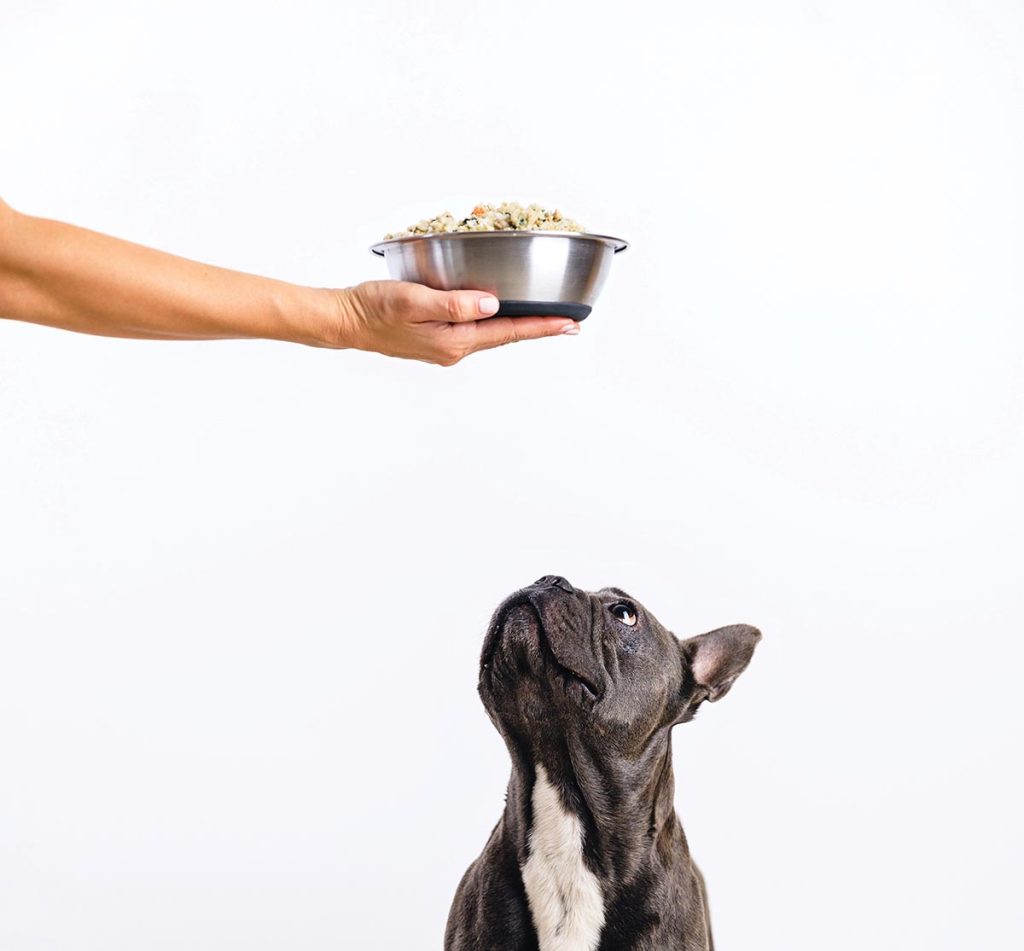Best Dog Food for Frenchies
In this article, we’ll cover your Frenchie's nutritional requirements at each life stage and how to read a dog food label so you can choose the best food for your new puppy.
What’s the best dog food for Frenchies? If you’re asking this question, you probably have a new Frenchie! That adorable little face gazes lovingly at you like you’re the most important person in the world (and you are!)
Of course, you want to feed your sweet Frenchie the best dog food and may be wondering, “What should I feed my dog?”
However, here’s what’s important to know about pet food. Dogs at every life stage have different nutritional needs, yet they always need essential nutrients and quality ingredients for a healthy, well-balanced diet.
Consider the vast differences in dog food brands. Some are high-quality dry dog food made with human-grade ingredients, while some use fillers instead of high-quality nutrition. Other healthy dog food options include homemade food (provided it’s nutritionally balanced) and fresh food.
In this article, we’ll cover your Frenchie’s nutritional requirements at each life stage and how to read a dog food label so you can choose the best food for your French Bulldog puppy.
First, let’s consider the three life stages of a dog.
The 3 Stages of a Frenchie

When you bring your new Frenchie puppy home, you gaze into those dark eyes that look like deep pools of ink. You’re head-over-heels with the way your pup cocks his head to question you when you show a ball or another toy. It’s the cutest thing.
But your Frenchie puppy’s hungry. What are you going to feed him? Before ordering kibble from Amazon or a grocery store, clarify your small breed’s nutritional needs.
First, puppies are energetic and need a lot of calories because they’re active and growing. Healthy puppies require a nutrient-dense, balanced diet of carbohydrates, protein, fat, and essential minerals like calcium. Puppy food has higher levels of protein, fat, vitamins, and minerals to support growing bodies. Puppy kibble is usually smaller, too, which makes it easier for small mouths to chew, and it’s meant to be highly digestible for those developing digestive systems.
These early months set the stage for your puppy’s health down the road, and it’s an excellent time to choose high-protein human-grade ingredients. Think veggies and lean proteins like chicken, fish, and venison. Sweet potatoes are healthy sources of carbs and fiber, along with brown rice and other whole grains.
Healthy human-grade foods include essential nutrients and support your puppy’s healthy skin and coat. Additionally, small-breed puppies have tiny tummies, so they need calorie-dense food to keep them full longer. In many cases, kibble may leave them hungry.
Teen to Adult Years
Around 9-12 months, your Frenchie transitions to an adult dog, and their dietary needs change again. If you’ve been feeding your pup higher-fat puppy food, you’ll want to transition to something else, or you risk packing on the pounds. That something else could be human-grade veggies and animal protein sources with healthy carbs.
Generally, adult Frenchies settle down a little, and since they’re not expending as much energy, you want to watch the portion sizes. A tubby French Bulldog is still cute, but extra pounds put your dog at greater risk of health problems.
The Senior Frenchie
As your Frenchie ages into an elegant senior pup, his dietary needs may change again. If your Frenchie has gained weight, you may need to reduce portions because extra pounds stress the joints and organs.
Common Health Problems with Frenchies (and What You Can Do About Them)

The French Bulldog’s build, sedentary lifestyle, and flat face can lead to obesity, respiratory problems, and other health issues.
Brachycephalic Respiratory Syndrome
Flat-faced and short-muzzled dogs are part of the Brachycephalic dog breeds. Obviously, the Frenchie is one and prone to this respiratory issue. Dogs with flat faces and short muzzles snort and wheeze a lot due to their bone structure. These small dogs can have an elongated palate, misshapen nostrils, and tissues that partially block your dog’s airflow. These breathing issues can worsen in hot and humid weather.
Obesity
Like many small breeds, Frenchies are prone to weight gain. An extra pound or two on a dog may not sound like much, but it can lead to joint pain, heart disease, and diabetes.
Pet obesity is such a problem in the modern world there’s even an organization for the prevention of pet obesity. Click the following link to learn how to tell if your Frenchie is overweight.
Ultimately, a healthy diet free of fillers and byproducts and adequate exercise can help manage your Frenchie’s weight.
Allergies
If your Frenchie has chronic skin issues like redness or itching or chronic ear infections, these can be signs of a food allergy. Common allergens are dust, pollen, and even certain foods.
The easiest way to test for allergies at home is to feed your Frenchie a limited-ingredient diet and note any changes. Some pet parents find success with grain-free food and a limited-ingredient diet.
Hip Dysplasia
This genetic condition relates to a hip joint that doesn’t form properly, and it’s common in some dog breeds, like Frenchies. A malformed hip joint can lead to arthritis, overall pain, and mobility issues.
Good nutrition, maintaining a healthy weight, and moderate exercise can help.
How to Choose a High-Quality Dog Food for Your French Bulldog

With the array of pet foods available these days, sorting through them can feel overwhelming. To make it easier, we recommend reading the label and avoiding dog foods that mention by-products, heavy preservatives, or contain mainly fillers like chicken meal.
You always hear about the importance of a balanced diet, but what does that mean? You’re right if you picture a plate of veggies rich in antioxidants, lean protein, and healthy carbs like whole grains or sweet potatoes. Your dog requires a similar balance of macronutrients to thrive, plus essential vitamins, minerals, and probiotics.
Like with your diet, eating high-quality whole foods improves your Frenchie’s overall well-being.
What special dietary considerations might your sweet Frenchie have? You might try different protein sources if your Frenchie has a sensitive stomach. Our venison and squash fresh food offers a novel protein and limited ingredient diet that helps many dogs improve their health. Fresh food could also be more accessible than highly processed kibble for your pup to digest.
How to Transition Dog Foods
Whether you’re transitioning from puppy food to adult food or transitioning to a different food entirely, you want to make sure you transition slowly so your pup’s digestive system has a chance to get used to the new food.
If you finish one food and immediately start your pup on another, you risk upsetting their tummy. We recommend slowly transitioning by replacing a small amount of new food with your pup’s existing food portion and working your way up to a complete changeover.
The best food for French bulldog is a healthy diet that supports your Frenchie’s immune system and digestive system and boosts your pup’s well-being from the inside out. Find out more about how fresh dog food supports your dog’s health.
This content is for informational use only and does not replace professional nutrition and/or medical advice, diagnosis, or treatment. It is not a substitute for and should not be relied upon for specific nutrition and/or medical recommendations. Please talk with your veterinarian about any questions or concerns.





